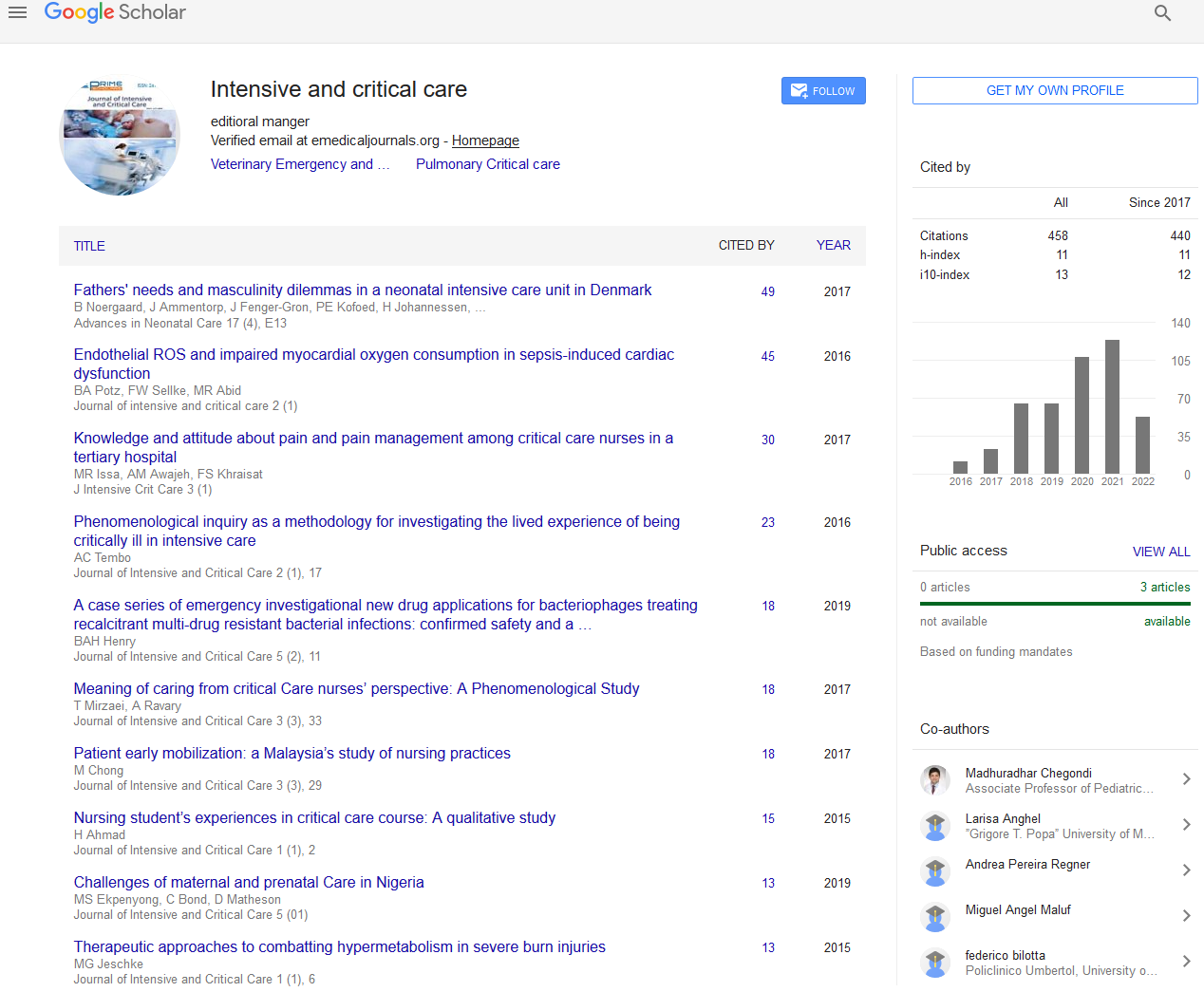Commentary - (2023) Volume 9, Issue 2
Antibiotic Resistance Associated with Selective Decontamination of the Digestive Tract
N.L. Plantinga*
Department of Medical Microbiology, University of Medical Center Utrecht, Netherlands
*Correspondence:
N.L. Plantinga,
Department of Medical Microbiology, University of Medical Center Utrecht,
Netherlands,
Email:
Received: 29-Mar-2023, Manuscript No. IPJICC-23-16190;
Editor assigned: 31-Mar-2023, Pre QC No. IPJICC-23-16190 (PQ);
Reviewed: 14-Apr-2023, QC No. IPJICC-23-16190;
Revised: 19-Apr-2023, Manuscript No. IPJICC-23-16190 (R);
Published:
26-Apr-2023, DOI: 10.35248/2471-8505.23.9.018
Description
Targeted decontamination of the gastrointestinal tract has
been shown to prevent severe infections and reduce mortality
in critically ill patients. We were unable to identify any historical
arguments against its use, such as the development of
bacterial resistance or lack of impact on mortality. This review
updates the evidence on the efficacy of selective gastrointestinal
decontamination and the issue of resistance development
using data from randomized controlled trials and meta-analyses.
They showed that SDD reduced severe lower respiratory
tract infections, bloodstream infections, and mortality while
controlling resistance. Surprisingly, SDD is not widely used in
clinical practice, although the evidence for SDD use in the Intensive
Care Unit (ICU) is high. The SDD has been the subject of
intense controversy among critics and supporters of the operation.
SDD opponents still cite historical arguments against its
use, including the lack of mortality impact and the emergence
of resistance. Two studies found that SDDs were used in only
5% and 30% of his ICUs in the UK and the Netherlands, respectively.
This is mainly due to insufficient evidence of efficacy and
concerns about tolerance. Moreover, SDD was recently ranked
as the worst maneuver for preventing ventilator-associated
pneumonia by an expert panel, although none have been published
on this subject. The reasons for this are multifaceted,
but longstanding disagreements between experts and opinion
leaders have been a major source of confusion. For example, in
the early 1990s, the first meta-analysis on SDD by the Cochrane
Italia Center in Milan already showed a significant effect of SDD
on mortality, but a biased meta-analysis was subsequently carried
out in the influential United States. It took four more meta-
analyses and two of his large RCTs before the opinion leader
admitted that SDD had a significant effect on mortality. More recently, the National Institutes of Health (NICE), while acknowledging
that SDD has an impact on morbidity and mortality,
noted that “few studies have been conducted in the UK and
are therefore reflective of current national health services.” not
in favour of SDD. History repeats itself! Evidence-based medicine
seems inapplicable to SDD, as did Semmelweis’ findings,
which were strongly opposed by Virchow, a veteran pathologist,
and influential opinion leader at the time. Previous experience
with thrombolytics suggests a similar pattern, with an
undesirable delay between the emergence of meta-analytical
evidence and clinical expert recommendations. DD has never
been promoted by pharmaceutical companies because cheap,
unpatented, and older drugs such as cefotaxime, polymyxin E,
tobramycin, and amphotericin B offer little benefit. Additionally,
SDD is not backed by datasheets that appear to be reliable
and is not marketed to clinicians in the traditional way. Pastes,
gels, or suspensions are not readily available over the counter.
Therefore, SDD use requires more involvement and oversight
by ICU teams, pharmacists, and microbiologists than simple
systemic administration of modern antibiotics on the market.
A recent example is the industry-sponsored Surviving Sepsis
Campaign, which advocates evidence-based medical interventions
for all but SDD. Additionally, critical care physicians are
unfamiliar with the pharyngeal and rectal surveillance culture
and fear it will increase the burden on the team. However, ICUs
with SDDs have a reduced workload due to lower infection
rates, reduced use of systemic antibiotics, reduced frequency
of tracheal aspiration, and absence of resistant strains requiring
patient cohorts or isolation. Finally, there is the interaction
between physicians and the pharmaceutical industry. The
same clinicians are invited to national and international conferences
to report data promoting these new drugs as first-line
antibiotics.
Acknowledgement
None.
Conflict of Interest
The author declares there is no conflict of interest.
Citation: Plantinga NL (2023) Antibiotic Resistance Associated with Selective Decontamination of the Digestive Tract. J Intensive Crit Care. 9:018.
Copyright: © 2023 Plantinga NL. This is an open-access article distributed under the terms of the Creative Commons Attribution License, which permits unrestricted use, distribution, and reproduction in any medium, provided the original author and source are credited.

